Rush to fix computers in England's courts
- Published

The Ministry of Justice is rushing to fix IT issues affecting courts across England.
Lawyers say trials have been delayed, jurors are unable to enrol and witness statements are inaccessible.
Twitter user @BarristerSecret said the "entire digital infrastructure" of courts had been "broken for days".
The Common Platform, a system shared between the police, the courts and the Crown Prosecution Service (CPS), was updated last June at a cost of £1bn.
The Ministry of Justice (MoJ) says the problems have "nothing to do" with that system.
In a statement the MoJ said: "We apologise to those who have been affected by the network issues that we have been experiencing over recent days. The urgent work we have been carrying out with our suppliers has led to significant improvements today, but this work is ongoing and we have contingency plans in place.
"While services have continued to operate and alternative network access is now in place for most, we know how frustrating this is for anyone affected and we are disappointed that our suppliers haven't yet been able to resolve the network problems in full. We continue to work with them to return services to normal."
Allow X content?
This article contains content provided by X. We ask for your permission before anything is loaded, as they may be using cookies and other technologies. You may want to read X’s cookie policy, external and privacy policy, external before accepting. To view this content choose ‘accept and continue’.
The disruption continues to "cause chaos" reports The Law Society Gazette., external
One criminal barrister told the publication that none of the computer systems at Leicester Crown Court had been working
Another said that at Highbury Magistrates' Court there had been confusion over which cases would be heard in which court
Connectivity problems were reported at Southwark Crown Court and the Old Bailey
Others reported that people arriving at court had been left hanging around for hours and cases had been adjourned
Chris Henley QC, who chairs the Criminal Bar Association, told The Law Society Gazette: "Short-term savings often result in wider costs to the public purse and cause a broken criminal justice system to fall further apart.
"Crumbling court buildings are bad enough for court users - both the public and criminal practitioners - but digital failures can have far more profound consequences for all those awaiting trial."